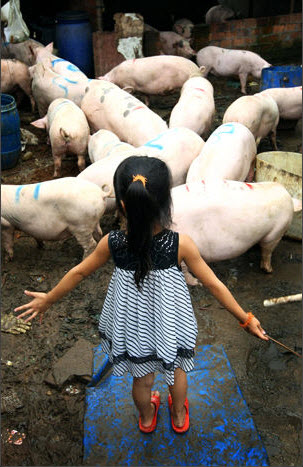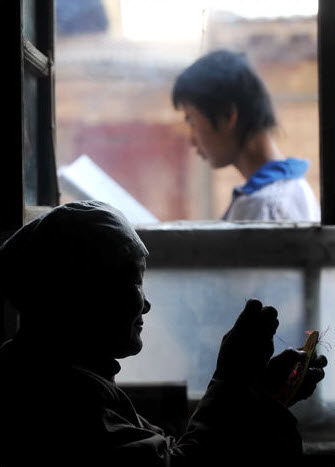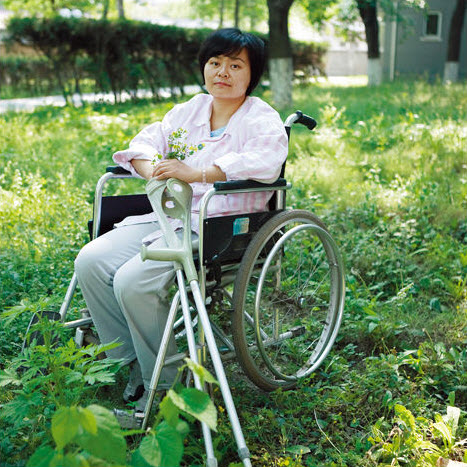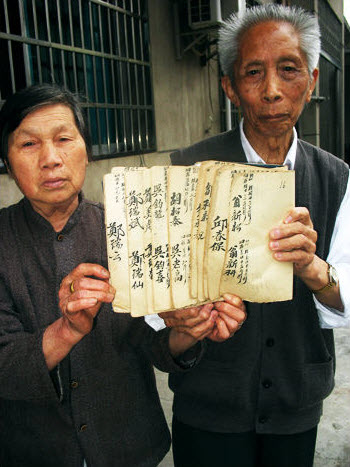Below are 62 “unseen” news photographs from 2009 and their original captions, translated into English, that were originally featured on NetEase, one of China’s most popular portal websites. We’ve also included links to related chinaSMACK posts from published during the past year. Thank you for your support. We wish everyone a happy new year and good luck in 2010!
— Fauna & chinaSMACK staff contributors
October 1st, Hefei, Anhui Province. A few migrant workers are watching the live National Day Parade in a dilapidated dormitory. They keep adjusting to antenna to reduce the static on the screen, sharing this country’s glory on that day.
On chinaSMACK:
- Training The Chinese Army For The National Day Parade
- CCTV’s National Day Parade Broadcast Disappoints Netizens
- Former Premier Zhu Rongji Missed By Chinese Netizens
- Truck Drivers Use Horns To Wish China Happy Birthday
- Patriotic Youth Celebrate National Day With Crazy Haircuts
November 11th, Beijing. The Central School of Art encouraged its students to get vaccinated for swine flu in the school auditorium. Compared to the SARS epidemic six years ago, because information was more transparent, the public was much more tolerant toward the influenza.
On chinaSMACK:
- Netizens Angry Shanghai Allowed Swine Flu To Enter China
- Swine Flu: China Quarantines Mexicans, Chinese Reactions
- Chinese Study Abroad Students Told Not To Come Home
February 28th, Hangzhou. The largest career fair in Zhejiang Province. More than 50,000 university graduates are waiting outside in the rain. In 2009, China has more than 7 million university graduates that are looking for work. On September 1st, the rate of employment for graduates was 74% (government statistics). China has already decided to slow the enrollment growth of universities. The rate of growth in 2010 will be only 3%.
On chinaSMACK:
- Young Deaf Girl On Her Knees, Begs Recruiter For Job
- Graduating University Schoolgirl Seeks Housewife Position
- Beijing University Graduates’ Miserable Living Conditions
- Earthquake Coke Boy Gets Free Admission To University
- Gaokao University Entrance Exam Stress Relief In China
February 22nd, Wuhan. The real estate agents in Panlong town are holding signs saying “90% off” and “80% off” to attract customers. Due to the financial crisis, Wuhan’s average real estate price fell to 2000RMB/square meter. But after the banks entered the housing market with large amounts of loans, Wuhan’s real estate price has recovered, with sales surpassing the same quarter in 2007.
On chinaSMACK:
- Post-80s Girl Lives In Toilet To Protest High Housing Prices
- High Real Estate Prices Make Young Men Do Stupid Things
October 26th 5 am, Xiangya Hospital, Changsha. 31-year-old Yang Yan waited the whole night for registration. When the hospital opened, she was knocked down by the crowd and trampled over, causing a broken shoulder. The difficulty in seeing a doctor pervades the country, the proposition for new healthcare reform is out, but the healthcare problem waits to be solved.
On chinaSMACK:
- Waiting All Night Outside A Hospital Hoping To See A Doctor
- Medical Care: Netizen Compares Hong Kong To Mainland
- Chinese Hospital Rushed By Patients & Ticket Scalpers
July 4th, Shanghai. A fan uses a traditional Chinese custom—kowtow, to mourn the icon of Western pop culture, Michael Jackson. Jackson’s death shocked the entire world, including China. More than 500 fans from across the country came to the memorial ceremony held at Shanghai’s Jinmao Tower.
On chinaSMACK:
- Michael Jackson Is Dead, Chinese Netizen Reactions
- Shanghai Michael Jackson 1 Minute Memorial Event – 7/12
- Little Chinese Kid Lip Syncs To Michael Jackson Song
February 26th, Changchun Street, Beijing. Guo Guo, who just had his 1st birthday, is getting an “Obama” haircut. To attract customers, the owner of this hair salon introduced the “Obama” Style. An American president influences the lives of ordinary Chinese in unprecedented ways.
On chinaSMACK:
- Obama Awarded Nobel Peace Prize, Chinese Reactions
- Chinese Netizen Questions For Obama During His Visit
- Chinese Obama Girl, In Red Coat, In Black Dress: Wang Zifei
March 20th, Kunming. Chengguan are demolishing an illegal building. The workers locked up the gates, and the chengguan decided to enforce the law by climbing over the building. In 2009, the chengguan continued to enforce the law in ways laden with controversy and conflict.
On chinaSMACK:
- Woman Sets Self On Fire To Protest Demolition Of Home
- Elementary Students Recruited To Be ‘Chengguan Youth’
- Kunming Residents Believe In Brother Chun To Save Homes
- Controversial Chengguan Handbook Outrage Netizens
- Along The River…After The City Managers Came…
January 23rd, Xi’an. 63-year-old Luo Guiqing is a roadside vendor. Usually, she is harassed by the chengguan, but that day, her eyes are filled with tears as she unexpected receives a sack of rice, a carton of oil, and 300RMB from them.
On chinaSMACK:
- Controversial Chengguan Handbook Outrage Netizens
- Hui Minority Beats Lanzhou Chengguan Onto Knees Crying
- Street Peddler Beaten & Paralyzed By Shanghai Chengguan
- Kunming Protest After Chengguan Beats Man to Death
- Elementary Students Recruited To Be ‘Chengguan Youth’
- Along The River…After The City Managers Came…
November 29th, Kunming. 28-year-old homosexual Nana and partner Atao lying in their 10-square-meter home. They’ve only been together for a month, but already have a strong bond. Atao is 25 this year. He’s bringing Nana to meet his parents in a few days. Even if their families don’t understand, they will stay with each other.
On chinaSMACK:
- Taiwan Holds Gay Pride Parade, Chinese Netizen Reactions
- Two Ladyboys In Southern China Publicly Seek Sex Change
June 16th, Beijing. Police are diverting traffic for an injured dog. This dog was hit by a car on a major street and was paralyzed. Two officers waited for hours for a veterinarian’s arrival. Beijing drivers and officers who usually only divert traffic for major government activities show their compassion.
On chinaSMACK:
- Beijing Police Officer Directs Traffic & Dances Cha Cha
- Yangxian County In Shaanxi China Kills Every Single Dog
- Retired Tianjin Teacher Rescues Stray & Abandoned Pets
- Caged Cats To Be Slaughtered For Meat Found In Tianjin
- Human Flesh Search For Hebei University Cat Killer
- “Most Beautiful Police Flower” Saves Suicide Jumper Girl
November 9th, Changchun City is once again hit by cold weather. More than 100 families on Changxing Street whose houses are being demolished lined up in order to pick the best replacement house. Entire families took turns waiting in line; the oldest among them is 75. They got what they wished for after persevering for two days.
February 4th, Yuzhong, Gansu Province. The villagers’ parade is asking the heavens for rain. The local farmers are using this ancient tradition to hope for prosperity. China has the largest artificially induced weather industry in the world, but these farmers in remote and poor areas are still powerless against frequent natural disasters.
February 27th, Kunming. Caregiver Li Jianbao at the First People’s Hospital reads a magazine to recharge himself after he helped the patients to sleep. The 50-year-old has worked as a caregiver for 7 years. As the Chinese population ages and more people leave home to work, more and more elderly cannot be cared for by their children. The demand for caregivers is rising everyday.
On chinaSMACK:
August 30th, Nansan, Yunnan. 4-year-old refugee Lu Xinglan from Myanmar is swinging. Since civil war erupted in Guogan, more than 10,000 refugees have poured into China’s Yunnan Province.
July 17th, Jiaxing, Zhejiang. Mr. and Mrs. Li Fengzhou from Henan Xinyang raise crayfish here for a living. For work, the family moved near the fish farm. In the summer heat, their two children are cooling off in an abandoned bath tub. This is their special game.
On chinaSMACK:
February 8th, Xi’an. Zhao Jun, from Zhouzhi, Shaanxi Province watches as her parents show their “Migrant Marriage and Birth Certification” to register her in the local school. She will be enrolled in a top elementary school—Xi’an Beilin District Friendship School. For the children of migrant workers, supplemental tuition, the various documents that need to be obtained, and adapting to local societies are still obstacles to obtaining an education.
On chinaSMACK:
January 7th, Shanghai. In a kindergarten classroom, the teacher directs the children to play a real estate trading game. Right now, to attend a public kindergarten in Shanghai, parents must own a house or be an invited special worker. Reality has let children realize the importance of owning a house at a very young age.
On chinaSMACK:
- Post-80s Girl Lives In Toilet To Protest High Housing Prices
- Shanghai To Offer Migrant Worker Children Free Education
March 3rd, Wuhan. Caidian Central Elementary School teacher Guo Bingxian is arranging bricks for the children to cross the river. The bridge to Yaocao River was destroyed by a flood in 2008, and nobody has thought to repair it. More than 300 children must cross the river like this to go to school.
On chinaSMACK:
May 5th, Beijing. Fenhua Hope Elementary School. The children are using self-made watering cans to improve the humidity of the classroom. This run down school for children of migrant workers was built 12 years ago; the conditions are incomparable to the city’s public schools. Many children of migrant workers return to these schools even after they’d transferred to city public schools because they could not adapt.
On chinaSMACK:
- Changing Chinese Children’s Lives With Photographs
- Shanghai To Offer Migrant Worker Children Free Education
September 15th, Changsha, 5 a.m. Five-year-old Mao Tun is sleeping in a tricycle. His mother, who is a city sanitation worker, is sweeping nearby. Like Mao Tun, China has 1.2 million children who come with their parents to cities in search of work.
On chinaSMACK:
- Shanghai To Offer Migrant Worker Children Free Education
- Mother Run Over By Cement Truck In Fuzhou
- Spoiled Child Slaps & Chokes Mother In Public For Toy
August 13th, Huizhou, Guangdong Province. After a pig farm was demolished, a little girl uses a stick to look after her family’s pigs. When the industry was profitable, more than 400 pig farms sprang up in Tonghu Town. But in August of this year, the local government began to crack down on illegal breeding.
November 15th, Wangmuo, Guizhou. 12-year-old Cheng Zhenbo only turns on the light to study before going to sleep. The electricity bill at his family is only 0.1 RMB each month. This child in a poor Guizhou mountain village lost his father when he was 2. His mother remarried when he was 9. He lives alone with his two brothers.
On chinaSMACK:
April 29th, before the visiting Japanese Prime Minister arrives, a guard lets his comrade help him clean his boots. Each member of the guard wears out 7 pairs of boots every year.
On chinaSMACK:
- China’s 2009 Military Recruitment Propaganda Posters
- Hostess Girls Of China’s 2009 National People’s Congress
March 2nd, Beijing, the People’s Convention Center. The “Two Meetings” last preparation stages, a security personnel is on duty. The 2009 national “Two Meetings” took place with more than 3000 representatives. At the same time, more than 600,000 workers took on jobs in security and administration.
On chinaSMACK:
August 11th, Anshan, Liaoning. Female worker Dong Weihua took off her mask at a 110-meter-tall mill. For 60 years, as China’s most important industrial base, more than 10 million people in the three northeast provinces have spent their youths at these mills.
On chinaSMACK:
August 29th, morning. Beijing People’s Square. A bus of students from Beijing Industrial University. They, after just finishing the first National Day Parade rehearsal as the audience, slumped into sleep on the bus, being taken away from the square. The entire National Day Parade consisted of 180,000 participants and 60 decorated cars. Students from Beijing Industrial University endured 3 months of difficult training.
On chinaSMACK:
- Training The Chinese Army For The National Day Parade
- CCTV’s National Day Parade Broadcast Disappoints Netizens
- Patriotic Youth Celebrate National Day With Crazy Haircuts
November 7th, morning. Changsha, Human. Provincial Children’s Hospital Swine Flu Emergency Room. The patient is long asleep, nurse Ye Hui naps outside the room. “I’m afraid he’ll dislodge the pipe on the ventilator in his sleep. I have to be here all night.” This year’s pervasion of swine flu gave many health care professionals great pressure and dangerous occupational hazard.
On chinaSMACK:
- Netizens Angry Shanghai Allowed Swine Flu To Enter China
- Swine Flu: China Quarantines Mexicans, Chinese Reactions
- Chinese Study Abroad Students Told Not To Come Home
November 26th, Beijing Tiananmen Square. Sanitation workers congregate before beginning the day’s work. Every Year’s October holiday week, the workers face difficult cleaning tasks. This year, the 60th anniversary, 440,000-square-meter Tiananmen Square and the surrounding areas produce 31 tons of garbage every day.
March 17th, Zhejiang Art School, Chinese opera students nap on the classroom floor after lunch. In recent years, although the Chinese opera class uses free tuition and other benefits to attract talent, the decline of the stage has caused continued low enrollment. Sometimes they can only get rural kids from poor families. Their study lives are plain, and job opportunities few.
April 25th, 9 pm. Beijing’s final Number 4 bus takes off from the central station. Passenger Ms. Shun has been taking Bus 4 since 1979, today she hugs and says goodbye to Ms. Zhao, the ticket operator that she’s known for 30 years. In Beijing’s new bus route reform, Bus 4 will disappear on Changan Street, where it has operated for 30 years. Ms. Zhao will continue her career as a ticket operator.
On chinaSMACK:
September 4th, Wenchuan premiere. The mobile movie theater is showing Jet Li’s “The Forbidden Kingdom”. On December 8th, the country’s first movie to set during the rebuilding of the Sichuan Earthquake started filming. In 2010, they will see their own story on the screen.
On chinaSMACK:
- Sichuan Earthquake Memorial Museum To Cost 2.3 Billion
- Sichuan Earthquake: The Man Who Carried His Dead Wife
- Beichuan Government Spend Millions On Luxury Cars
- Earthquake Coke Boy Gets Free Admission To University
- Chinese Netizen Reactions To Jet Li Becoming Singaporean
December 16th, Huining, Gansu Province. Huining Second Middle School third year student Zhang Xuliang studies outside the window of a rented house. His grandmother Zhang Ruihua, who came to town to accompany him, works on some sewing. Huining, Gansu is a national level poverty county. Many rural families see supporting children to go to university as the main way to end their destitution. In town, there are a few “accompaniment villages” where thousands of parents live.
On chinaSMACK:
- Rural Chinese Young Girl & Family Working In Brick Factory
- Impoverished Farmer Struggles To Raise Abandoned Girl
Wu Zhen, 33, originally a nurse at Beijing Huaxiang Hospital. On April 10th, 2003, while interning at Beijing University People’s Hospital, she was infected by a SARS patient. Now she has ten cases of bone death. In Jan 2007, because her bones were severely degenerated, she underwent experimental bone transplant. After six years, SARS seems to have disappeared in the public eye. The overuse of steroids during the SARS epidemic is widely blamed as the real cause of patients’ bone deterioration.
December 2nd, Zhang Na rests outside her husband Zhao Peng’s hospital room so he doesn’t see her tiredness. Zhao, who only has a middle school education, used to be the local barefoot doctor. Nine years ago he alone took on the responsibility of being Guizhou Province Dafong County Youshan Village’s elementary school teacher. November of this year, Zhao was suddenly diagnosed with leukemia, struggling for life. 114 students will once again face not receiving an education.
March 22nd, Kunming. Journalist photographer Gao Yongyong climbed onto a building to shoot pictures of a fire. He accidentally fell and sustained grave injuries. Right before the fall, he reminded his colleague to “be careful, don’t fall down”. After waking up, his first words were “where is my camera?” Every year, countless reporters are violently attacked in different ways, some even lose their lives. Because of this, journalism is considered a high-risk job.
On chinaSMACK:
- Pretty TV Reporter Attacked By Shandong Village Official
- Zhejiang Young Man’s Suicide Jump Broadcast By News
May 30th, Yunnan Ruiliwanpan Port. Nine Chinese soldiers that have lived in Myanmar for more than 67 years return home. During the Sino-Japanese War, 300,000 KMT soldiers went to battle in Myanmar, more than 100,000 died, and thousands settled down there. Today, finally, falling leaves return to the root.
On chinaSMACK:
August 19th, relocation of residents started at one of the sources for the Southern Water to North project. Xizhou County, Henan Province’s senior resident Wang Jiuqing watches as furniture is loaded onto a truck. In 2014, the Water Project will relocate 440,000 residents. Henan Xizhou County’s highest housing compensation is 450 RMB/square meter.
November 30th, Beijing Yangzha peninsula, a couple that just came from Hebei sits on the bike lane, waiting for friends to pick time up. In a metropolis like Beijing with 20 million people, there are countless youths that come here to chase their dreams every day.
December 5th, Hefei. Feng Lei and Li Peipei are in a house they share with others. They married in 2008, and will be able to move into a new apartment in a few months. For that apartment, they borrowed 800,000 RMB from their parents. Now, half of their income each month is used to pay the mortgage. When he mentions how he hesitated to buy an apartment at the beginning of the year, Feng Lei becomes frustrated. In the second half of this year, the entire country’s real estate prices rose sharply.
On chinaSMACK:
- Post-80s Girl Lives In Toilet To Protest High Housing Prices
- High Real Estate Prices Make Young Men Do Stupid Things
March 31st, Beijing. A man posting ads on the wall jumps high, so that his ad will be safer, and won’t be ripped off. These blemishes in the city are a priority for city appearance law enforcement [chengguan], but these ads are a way to make a living for many with low income, and give many people information on housing for rent.
September 1st, Lanzhou train station, more than 1000 migrant workers going to Xinjiang to pick cotton are asleep on the ground. To harvest all of the cotton before they’re spoiled, more than 200,000 migrant workers rush to Xinjiang. What attracts them is that in the next 40 days, through working more than 10 hours a day, they will make 3000 RMB.
On chinaSMACK:
Novembr 2nd, Guangzhou, 16 workers climb onto Haizhu Bridge, to ask for unpaid wages. Haizhu Bridge, located in the city center and built in 1929, has become the best location for petitioning for unpaid wages. The local traffic is often congested because of this, causing residents’ complaints.
On chinaSMACK:
January 1st, Beijing Pi Village. A young worker is performing a song he wrote about working. In a year, they made three albums about working, and founded a working culture museum, using different temporary living permits to organize China’s migrant policies since 1949. a new generation of migrant workers use brand new ways to blend into the cities.
On chinaSMACK:
September 1st, Beijing. Cui Ying, from Yanan, Shanxi, is with her husband and child, selling cut paper designs in front of a supermarket. Her husband and child are both diagnosed with a bone disorder, and the family came to Beijing in May to see a doctor. Cutting paper is Cui Ying’s skill, and the family’s only income source. One design sells for 10 to 100 RMB, but sometimes, she couldn’t sell a single one.
On chinaSMACK:
- One-Legged Beggar Artist Draws Mona Lisa On Sidewalk
- Handicapped Chinese Man Fixes Bicycle Tire With His Feet
- Chinese Wedding Photos Of Midget Groom & Normal Bride
December 19th, a garbage dump on the outskirts of Guiyang City. A family from a remote mountain village is tending to a fire. As the recycling industry grows, many realize that garbage is valuable. Therefore many take their families to live in a garbage dump, find the reusable items in the dump, and sell to recycling departments. Each person can make almost 1000 RMB every month.
On chinaSMACK:
- Villagers Loot Diesel From Leaking Oil Pipeline In Shandong
- Rural Chinese Young Girl & Family Working In Brick Factory
- Discarded Food Waste Slop Recycled Into Cheap Cooking Oil
- Naked 10-Year-Old Girls Playing On Trash-Filled Balcony
March 17th, Wuhan, a man is kneeling to the woman inside the cab, begging her to buy a newspaper. This man lives in Wuhan Danshuichi, his parents are long divorced and he has a mental disorder. He has always supported himself by selling newspapers.
On chinaSMACK:
- One-Legged Beggar Artist Draws Mona Lisa On Sidewalk
- Handicapped Chinese Man Fixes Bicycle Tire With His Feet
March 26th, Hangzhou, 42-year-old Qin stands in a building that’s waiting to be demolished. He’s leaving for Xinjiang the next day to be a paint worker. Due to the financial crisis, he lost his job two months ago and has been living in this building since. In 2009, prompted by 4,000,000,000,000 RMB of investment, the economy shows signs of recovery. The pending large-scale unemployment of migrant workers was diverted.
On chinaSMACK:
February 3rd, Wuchang train station. 5-year-old Lou Jingjing and her two-and-a-half brother Lou Zaihua followed their parents onto the train back home. During the 2009 Chinese New Year, more than 192 million people took the train. During this time, in order to go home, millions and millions of migrant workers take their children, traveling between city and rural areas.
On chinaSMACK:
- Charity Gives Migrant Workers Train Tickets & Cash
- Spring Festival Train Ticket Lines In Ningbo & Xian
August 2nd, Guangdong Dong Dongwan, Wu Yangshen kisses his daughter. The baby was born a month ago in Shilong People’s Hospital. Because of a medical mistake, she sustained severe brain damage. Facing expensive treatment fees, a complicated medical malpractice lawsuit, and difficult treatments, Wu Yangshen buckled under the pressure and posted on the internet his intention to kill the baby, but under the support of the media and netizens Wu has decided to persevere.
On chinaSMACK:
- Girl Struggles To Raise Money For Own Heart Operation
- Impoverished Farmer Struggles To Raise Abandoned Girl
August 30th, Hunan Changsha. An art major graduate of Changsha University, Yuan Chengxuing is working for a moving company. He’s graduated for 2 years, and this is his 7th job. He gets paid 1500 RMB per month. Two other university graduates hired by the company left after working for half an hour, but Yuan didn’t. He said he’d rather “eat bitterness” [endure hardship] than depend on his parents.
On chinaSMACK:
- Beijing University Graduates’ Miserable Living Conditions
- Young Deaf Girl On Her Knees, Begs Recruiter For Job
- Graduating University Schoolgirl Seeks Housewife Position
October 31st, Wuhan. “Walking Mother” Chen Yurong wore out 4 pairs of shoes in 7 months. She walks 10 km everyday to reduce fat tissues in her liver so she can donate part of her liver to save her son, who has a congenital liver disease. November 3rd, her wishes were fulfilled and the operation was carried out.
On chinaSMACK:
- Girl Struggles To Raise Money For Own Heart Operation
- Impoverished Farmer Struggles To Raise Abandoned Girl
- Mother Run Over By Cement Truck In Fuzhou
- Spoiled Child Slaps & Chokes Mother In Public For Toy
May 1st, Sichuan Beichuan. 43-year-old expectant mother Chen Rong is working to rebuild her home. Her son perished in the Sichuan Earthquake. After, she chose to become pregnant again. In places hit by the earthquake, many mothers that lost a child ignored the dangers of becoming pregnant at an advanced age and chose to give birth again.
On chinaSMACK:
- Sichuan Earthquake: The Man Who Carried His Dead Wife
- Beichuan Government Spend Millions On Luxury Cars
- Sichuan Earthquake Memorial Museum To Cost 2.3 Billion
- Earthquake Coke Boy Gets Free Admission To University
- Spoiled Child Slaps & Chokes Mother In Public For Toy
November 29th, Hubei Wuhan. 2010 exams to become a government official. That day, almost 1 million people took the exam to fight for 15,000 government positions. In the competitive job market, more and more university graduates chose to try for government positions.
On chinaSMACK:
- Beijing University Graduates’ Miserable Living Conditions
- Gaokao University Entrance Exam Stress Relief In China
April 23rd, Beijing. Babaoshang Funeral Home, the only 2 “post-80’s” undertakers Zhang Yang and Zhang Qi work on the deceased. Discrimination used to make the funeral home an unpopular career choice, but the competitive job market and good benefits has made this job attractive in recent years. But for today’s youths, choosing this industry still requires considerable courage.
On chinaSMACK:
June 5th, Sichuan Guangan, Migrant worker Li Jun who’s come back home listens intently in class. Because he lacks skills, Li Jun decided to go back to school after becoming unemployed in the coastal areas, hoping for a better future. Because of his age, he cannot absorb the material as fast, and the teacher often helps him outside of class.
On chinaSMACK:
May 26th, Jiangxi Shangrao, 85-year-old Deng Yidong used 67 years to finish paying off his father’s old debt. In 1942, Deng’s father was killed by the KMT, leaving behind more than 10,000 RMB of debt. Deng worked very hard trying to pay off the debt, but was hindered by the Cultural Revolution and natural disasters. After 67 years, he finally paid back all of the 106 villagers who were his father’s creditors.
On chinaSMACK:
September 22nd, Hunan Jizhuang Village. Yang Yunhua constructed a “breathing machine” from washing machine pipes and a bicycle to keep her severely ill daughter alive. China has already introduced collaborative medical insurance in the rural areas, but it’s not enough to cover a ventilator. Helpless, Yang’s family has decided to find ways of treating her daughter themselves.
On chinaSMACK:
November 13th, Wuhan, Xiao Li waits in front of the market where she was abandoned, hoping to meet her biological parents. 24 years ago, Xiao Li was left by her parents on the street. Now, she has been diagnosed with leukemia, desperately needing blood relatives’ bone marrow donation. Almost in their 60’s, her adoptive parents are helpless as Xiao Li posts on the internet and waits at the market. “You abandoned me, but I’m still grateful that you gave me life,” Xiao Li says of her biological parents.
On chinaSMACK:
- Girl Struggles To Raise Money For Own Heart Operation
- Impoverished Farmer Struggles To Raise Abandoned Girl
May 8th, Chongqing, 43-year-old Li Hong from Hechuan walks into Yunnan Honghezhou Police station to turn himself in. 19 years ago, he fled after killing someone in a drunken rage. Although he missed his mother he didn’t dare contact his family. 19 years later he finally had the courage to turn himself in. Although it was a difficult decision, he could not escape his own conscience.
March 22nd, Beijing, a couple is receiving dialysis in a “self-help” dialysis room. A group of people from Beijing, Inner Mongolia, Shanxi, and various other places who have kidney conditions, but cannot afford the hospitals’ dialysis fees, organized and built a “self-help” dialysis room, and signed an agreement. They know that this is illegal, but facing the high fees, they choose to break the law. They say, “Our principle is to survive.”
July 19th, Yunnan Shuifu, farmer Li Zhenqing turns on a light bulb in his dark home. Four months ago, he and 80 other migrant workers went to Anhui Fengyang to work in construction. Because of breathing in dust, many of them were diagnosed with lung conditions. They didn’t stay silent, but instead underwent an operation to inspect their lungs, using the law to gain a one-time compensation of 4.5 million RMB from the Fengyang government.
On chinaSMACK:































































42 Comments
Leave a Reply3 Pings & Trackbacks
Pingback:Mutual admiration society « Snarkmarket
Pingback:What I’m reading ed. 100116 « The Hermitage 3.0 (Beta)
Pingback:Son spends 67 years paying off father’s debt. « Joyce Lai